
New series shares research on how to better support students
Teaching and Learning Research Colloquium invites researchers to share learnings with faculty and staff
A new colloquium series is helping to improve support for students through the sharing of knowledge and research.
The Teaching and Learning Research Colloquium Series features UM faculty and staff sharing their knowledge, research and success stories with others from across the institution. The colloquium was launched with a single event last year and is expanding to a three-part series.
“There’s incredible work going on at UM,” says Matthew Quesnel, member of the Science of Teaching and Learning team at The Centre for the Advancement of Teaching and Learning, and chair of the series. “We wanted to provide an opportunity for faculty and staff to get together and talk about students’ support needs, barriers students may face in seeking help, and effective strategies for supporting and enhancing student learning.”
The first session: Not Left to Write: Reflections on Integrating Writing Tutors in the Undergraduate Classroom, takes place Wednesday, November 13. Dr. Kenneth MacKendrick, Professor and Department Head of the Department of Religion and Kathy Block, Instructor with the Academic Learning Centre (ALC), will discuss how they integrated peer writing tutors into MacKendrick’s undergraduate religion classes. The goal of the integration is to lower student anxiety about writing, increase student engagement and build skills for clear communication in writing.
MacKendrick and Block will share what they have learned about the impact of integrating writing tutors in the classroom, both for students and instructors, as well as observations from other, similar ALC course-specific initiatives.
Each session of the Teaching and Learning Research Colloquium Series will include a 25-minute presentation, followed by a discussion period and refreshments, providing a space for further engagement and networking.
“This work is a great case study for how we can integrate supports into the classroom and look for new and innovative ways to connect students to existing resources,” says Quesnel. “We hope that, along with sharing information, these sessions inspire faculty and staff to look at how we can better assist and support students.”






